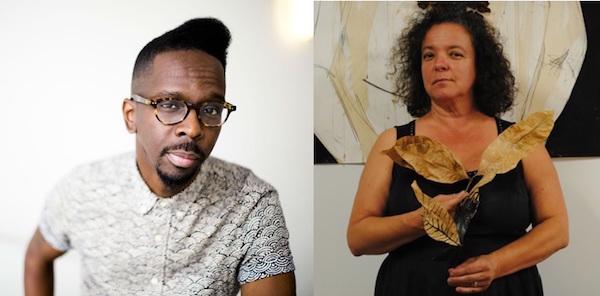Creativity Connects All of Us

The NEA will release a report on September 19 called Creativity Connects: Trends and Conditions Affecting U.S. Artists. The report--developed with the Center for Cultural Innovation--looks broadly at the impact on artist careers of phenomenon such as the ever-increasing demands of technology, burdensome student debt, income instability, and the precariousness of the gig economy.
As a preview to the release of the report, we invited artists Fahamu Pecou and Maritza Mosquera to offer their thoughts on some of the trends and conditions affecting their careers. Pecou and Mosquera each participated in one of 10 roundtables convened around the country that together formed part of the research for the report.
On technology
MARITZA MOSQUERA: I have a strange relationship with technology. On one hand, technology is an art material, like paper and ink and pencil. On the other hand, since my work is particularly about process, I've always had to be the documenter and/or the person to promote my work. People need to know what happens during my projects so there’s a secondary element of exasperation. I know that the tools are ever-evolving, but I can't get to them fast enough.
Also, I feel that the overall quality of art work is diminishing because of digital demands. There is pressure to always be producing and disseminating something for online venues. It takes so much time. Plus, there should be more of an interrelationship between real life and online experiences. Technology makes everything easily accessible, but experiencing art first-hand, live, is important.
FAHAMU PECOU: My early career extended from my use of technology. In the early 2000s, I began using sites such as BlackPlanet and Myspace to promote/market my brand. Additionally, the digital space became a site for performance art and experimentation. Through the creation of myriad avatars and profiles, I would interact with other users as various characters. Ultimately the digital space afforded me national exposure before my work ever hung in any galleries.
I continue to remain engaged in emerging technologies, specifically in the area of social media. These sites offer me the ability to engage, experiment, debate, and discover ideas. And similar to my early experiments with social media, it also allows my work to have an international reach, specifically into communities where the “white box” of the art world is barely a consideration.
Technology also remains a medium. It has allowed me to work in digital video, short film, music, and more in ways I might not otherwise be able to do.
On the gig economy
MOSQUERA: I have had various full-time jobs in my life, but I have chosen the “gig economy” as a way to move forward with my work and pay the bills. I must say, the gig economy has fed me but it has also exhausted me. When I was younger I took various teaching jobs to make money, but after grad school I began to focus on museum education and now my work is about art and social change.
Finding work is a constant job. I don't mind being working-poor; I've figured some of that out. Maybe I’ve settled for it. I know I'd rather not be poor but at least in this gig economy I can be in my studio and in community and have time to work some things up that I want to put out in the world.
PECOU: I believe that the artist lifestyle is often woefully uncertain. As such, it takes a really dedicated and tough-skinned person to endure the sharp ups and downs, the disappointments, and the very humbling nature of this way of life. The gig economy plays a major part in this. It is similar in many ways to those who are seen as living check-to-check. This can generate anxiety, but can also be a catalyst to push you to be your best.
A major difference, however, is that a person living check-to-check is assured a check. The gig economy is not always guaranteed. Despite your best efforts, there is always a risk that the exhibit won’t yield any sales.
On what artists need
MOSQUERA: I think artists need operational funding, I do for my art studio operations as a professional entity, not only for a project. I need an assistant. I need office supplies. I need a new computer and some funding for publishing. Also, it would be a huge breakthrough for me to have an entity to help mediate collaborations; someone to accompany me during conversations with potential funders, collaborators, publishers, and exhibitors.
PECOU: Having a stable foundation (i.e., home, studio) from which to work is perhaps the most crucial need. Financial security or at least a healthy knowledge of finance and money management is also extremely beneficial. To be an artist in this country, in this time, means that you should create like a god. Command like a king. Work like a slave. Love like a mother.
Pittsburgh, Pennsylvania artist Maritza Mosquera’s current work includes a collaboration with the Jewish Association on Aging in which she will develop arts engagements—integrated with existing programming—for participants with dementia and Alzheimer’s disease. Another project, Fracking: the Body opens space for a community conversation about the healing process of our body and its relationship to our environment’s healing from gas extractions from Marcellus Shale deposits in the Pittsburgh region. A portrait and text installation are part of this work.
Based in Atlanta, Georgia, Fahamu Pecou is a visual and performance artist as well as scholar whose works explore hip-hop, fine art, and popular culture. Among his recent projects is TALKING DRUM, which features drawings, sculpture, and sound installations that explore Black popular music and 1960s social justice movements. Do or Die: Affect, Ritual, Resistance just opened at the Halsey Institute of Contemporary Art at the University of Charleston in South Carolina. In Pecou’s words, the exhibition asks, “Under looming threat of death, how might we inspire life?”




